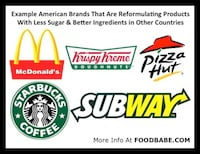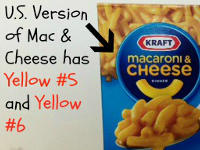Protein shakes, powders, and supplements are incredibly popular with the health conscious crowd. Considering what typical protein shakes promise – sleek muscles, weight loss and a quick, easy “healthy” meal replacement – it’s logical to see why, but is your protein shake safe? Unfortunately, the food industry is making an absolute killing (maybe literally) selling ones that are filled with highly processed denatured proteins, chemicals, preservatives and other additives. There’s one thing in common for all of them – they are all processed and deciding on whether or not they are actually real food comes into question. Now not all processed things we put in our body are technically bad for us – but understanding what exactly is in your protein shake is critical to deciding whether to consume it, select an alternative, or discontinue use all together.

GET INFORMED
We’ve discussed GMO’s here, Artificial Colors here, Natural Flavors here, Carrageenan here, Antibiotics here, and Hormones here before so I won’t go into them again in detail specifically. Regardless, you should know consuming a protein drink with any of those ingredients is a risk to your health.
NOT CERTIFIED ORGANIC
Most protein powders on the market are not certified organic, nor are they Non-GMO Project Verified. That means all of them might contain GMOs and most definitely contain pesticides that are considered harmful and potentially toxic with long-term exposure. This increased exposure is linked to birth defects, nerve damage, and even cancer. The President’s Cancer Panel has urged us not to consume food sprayed with pesticides and doesn’t believe any amount is safe. Because of this reason, I can’t imagine willingly wanting to spend a serious chunk of change (protein shakes are expensive!) to buy any of these listed products as a way to help build muscle, lose weight or replace a meal.
IS YOUR PROTEIN DRINK SAFE? Hmmm… NOT WITH THESE INGREDIENTS:
Heavy Metals
Consumer Reports conducted an eye-opening investigation that revealed several protein powders contain heavy metals – specifically arsenic, cadmium, and lead. EAS Myoplex tested for two heavy metals in higher amounts than the USP limit of exposure per day. Muscle Milk had the highest of all levels of all brands tested.
Cadmium raises special concern because it accumulates in and can damage the kidneys, the same organs that can be damaged by excessive protein consumption. And it can take 20 years for the body to eliminate even half the cadmium absorbed today.” This is a highly toxic metal, and while there are some cases where decisions have to be weighed against relative risks, accepting that you have to be exposed to any cadmium at all in your protein drink after your workout is definitely not one of them,” says Michael Harbut, M.D., director of the Environmental Cancer Initiative at the Karmanos Cancer Institute in Royal Oak, Mich.
“When these toxic heavy metals are combined in a product that is marketed for daily use, that raises serious public health concerns, especially for pregnant women, children, and young adults,” says Burns, who has been a toxicology consultant to state and federal government agencies.
Soy Protein
Many protein drinks use soy protein concentrate or soy protein isolate in conjunction with other proteins. Over 90% of the soy produced in this country is GMO and contaminated with Roundup herbicide, but that’s not the only reason to avoid soy protein. When soy is looked at from a macronutrient perspective, it can give the illusion of a very healthy food – full of plant based protein, essential amino acids and fiber. However, the soy that is grown and produced today is largely hybridized, making the amino acids largely indigestible leading to digestive issues that have caused many people to be allergic to soy. What’s worse is when soy is isolated to just its protein state, it becomes severely denatured and can cause hormonal disruptions because of the excessive amount of estrogen contained in it. Soy also has an abundance of phytic acid that leaches calcium and other vital minerals from your body.
Maltodextrin & Fibersol
Calling out an ingredient filler like maltodextrin may make you think I’m being nitpicky – but is this carb substitute that is likely derived from genetically modified corn really necessary in protein powders? Maltodextrin can be used to make the substance “fibersol”. This is made by heating maltodextrin at very high temperatures and treating it with enzymes and acids to make a fiber your body simply can’t digest and makes you feel artificially full. If you are eating enough plant-based foods, there is no reason to supplement with this type of chemically derived fiber. Fibersol is just another additive that does absolutely nothing for your long term health. Why not add a real food like spinach or a banana to your smoothie instead?
Acesulfame Potassium or Acesulfame K
Whey Protein Isolate
Whey protein isolate is highly processed, unlike whole protein food concentrate. Most whey protein isolates start from ultra-pasteurized conventional milk that has antibiotics and growth hormones and are then exposed to acid processing, stripping alkalinizing minerals, naturally occurring vitamins and lipids. This processing makes whey protein isolate over acidifying in the body. Chronically consuming whey protein isolate without appropriate balance of alkalizing foods, can acidify your body and over time increase your vulnerability to degenerative disease. This overly processed form of whey can be found in a lot of popular protein drinks.
Luckily, you don’t have to rely on protein drinks because simply eating a variety of real food alone gives you plenty of protein.
But, if you are still concerned about protein you could make a protein-filled real food smoothie like this or choose from any of these real food sources of protein below:
Meat sources of protein – beef, pork, poultry, eggs, yogurt, cheese, fish (very important to choose organic if you go this route)
Vegetarian sources of protein – legumes (dry beans, lentils, and peas), nuts and seeds (almond butter, sunflower seeds, hemp seeds), whole grains (oatmeal, quinoa, brown rice, pasta), dark leafy vegetables, and some fruits like avocado
SO ARE THERE ANY HEALTHY PROTEIN POWDERS?
Fortunately, there are a few Food Babe approved protein powders, including Organic Plant Protein Superfood 30 Shake Tera’s Organic Whey, Nutiva’s Hemp Protein that do not contain any of the ingredients mentioned here, and would fall under the definition of “real food” in my book. If you decide to supplement your protein, it is very important to double and triple check the ingredient list and check with the manufacturer to see how they process their protein.
If you know someone using a questionable protein powder, please share this post with them – I know they will be grateful to know the truth, considering how much some of these types of supplements cost!
Xo,
Vani
Updated 8/2016: Additional research on protein powders added and removed outdated information.








Are use a Pea Protein By Olympian labs Inc. wondering if you’ve heard of that and you think it’s safe ?also I have a plant-based Vega protein chocolate flavored smoothie mix wondering if you’ve heard of that and if that’s safe?Thank you for doing the nut butters research I’ve been using almond butter for months trying to get one without sugar and one that’s healthy
Hi Vani,
I love following you and learning all about food and what is really happening behind closed doors with our food industry.
I am however curious about your thoughts and knowledge on Shakeology- a superfood Shake.
I’ve looked up the ingredients and my doctors say it’s a great shake.
What are your thoughts?
Thank you.
Vani discusses Shakeology here: https://foodbabe.com/protein-powders-to-never-buy-again-and-what-to-choose-instead/
What is your opinion of the NAKED WHEY brand ? Or does any on else have a thought on that protein ?
Have you looked at the Isagenix products? I know people consuming them for years and years and are very healthy, Their whey is from free cows with no routine hormones or antibiotics. Vitamins extracted from food.
but of course, you would never buy any other as you sell your own. We are full of GMO and pesticides everywhere, and if we go to restaurants even worst.. I bless my food and keep detoxing once or twice a month.